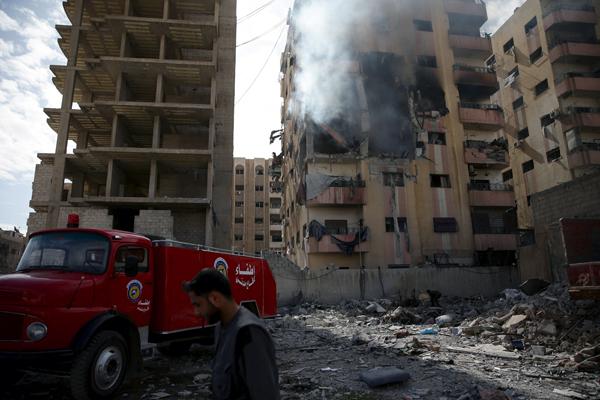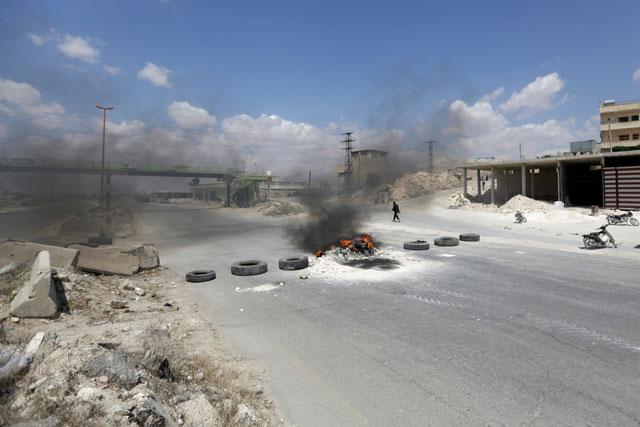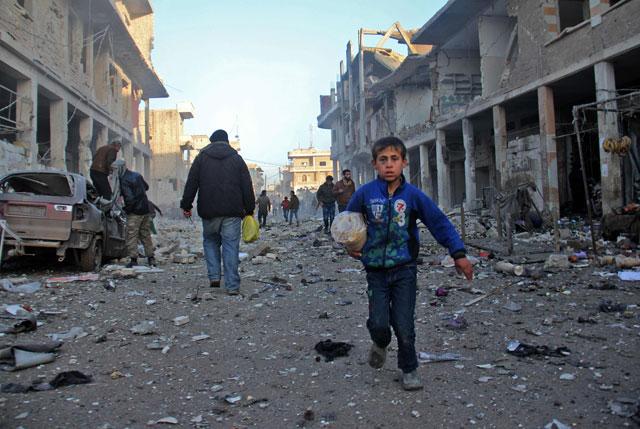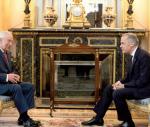You are here
UN envoy wins Syria gov’t green light for aid convoys — UN
By Reuters - Feb 16,2016 - Last updated at Feb 16,2016

A civil defence member works at a site after air strikes by pro-Syrian government forces in the rebel-held Douma neighbourhood of Damascus, on Sunday (AFP photo)
GENEVA — The Syrian government has approved access to seven besieged areas and UN convoys are expected to set off in days, the United Nations said on Tuesday after crisis talks in Damascus.
UN Special Envoy Staffan de Mistura, who won the green light at talks with Foreign Minister Walid Al Moualem, said the world body would test the government commitment to allow access on Wednesday but gave no details.
Their meeting in Damascus came at a time when government forces have been advancing rapidly with the aid of Russian air strikes, and just days before an internationally agreed pause in fighting is due to take effect.
De Mistura said they had discussed the issue of humanitarian access to areas besieged by all sides in the five-year war.
"It is clear it is the duty of the government of Syria to want to reach every Syrian person wherever they are and allow the UN to bring humanitarian aid," de Mistura said in a statement. "Tomorrow we test this."
The UN Office for the Coordination of Humanitarian Affairs (OCHA) said that Syria had approved access to Deir Ezzor; Foua and Kafraya in Idlib; and Madaya, Zabadani, Kafr Batna and Mouadamiya Al Sham in rural Damascus.
"Humanitarian agencies and partners are preparing convoys for these areas, to depart as soon as possible in the coming days," the OCHA said. It was not immediately clear whether the convoys would begin on Wednesday, as de Mistura had indicated.
Nor was there any indication of a breakthrough on access to areas besieged by armed opposition groups.
UN-backed peace talks are scheduled to resume in Geneva on February 25, after de Mistura suspended a first round earlier this month.
Last Friday global powers meeting in Munich agreed to the pause in fighting in the hope that this could allow the talks to resume, but the deal does not take effect until the end of this week and was not signed by the Syrian warring parties.
"We are witnessing a degradation on the ground that cannot wait," UN spokesman Ahmad Fawzi told a news briefing. "The reason [de Mistura] suspended [the talks] was, as you know, that cities were still being bombed, people were still being starved on the ground."
Supply routes
The Syrian government is meanwhile advancing in the north of the country with Russian air support. Damascus says its main objectives are to recapture Aleppo —- Syria's biggest city before the war — and seal the Turkish border, lifeline of rebel-held territory for years.
Those would be the biggest victories for Damascus of the war so far, and would all but end rebel hopes of overthrowing President Bashar Assad, the goal they have pursued since 2011 with the support of the West, Arab states and Turkey.
Syria's ambassador to the United Nations in Geneva, Hussam Aala, said in an interview in the daily Tribune de Geneve: "We have done all we could to facilitate the passage of aid convoys in January and February."
"The advance of the Syrian army in this region has allowed us to break the siege imposed against two towns, Nubul and Al Zahra. It opened the way for the Syrian Arab Red Crescent to deliver aid to 70,000 residents. Our objective was to cut all the supply routes for arms and for men to the terrorist groups armed by Turkey."
The United Nations has reported that hospitals have been struck in northern Syria in areas where Russian and Syrian warplanes are launching air strikes as part of their advance.
UN rights spokesman Rupert Colville condemned the air strikes on hospitals and schools in Idlib and Aleppo provinces.
"If it's deliberate, intentional targeting, then it may amount a war crime. But at this point, we're not in a position to make that judgement. Ultimately that's only a court that can make that judgment, and you need sufficient evidence," he said.
"Clearly those two, both Russian and Syrian planes, are very active in this area. So obviously they should know who is responsible."
Russian news agencies quoted a Russian defence ministry spokesman as saying on Tuesday that Russia's Caspian Sea flotilla did not have a boat capable of firing a ballistic missile on the hospital in Idlib province.
International humanitarian law says hospitals and health care personnel must be protected, Colville said.
Related Articles
GENEVA — The United Nations will take the "last resort" option of air drops of humanitarian aid if access to besieged areas in Syria is not
GENEVA — The ceasefire in the Syria war is holding for the most part but humanitarian aid is still not getting through to besieged areas whe
GENEVA — Syria has given approval for humanitarian convoys to reach all of the country’s 19 besieged areas by the end of the month, the UN s
















